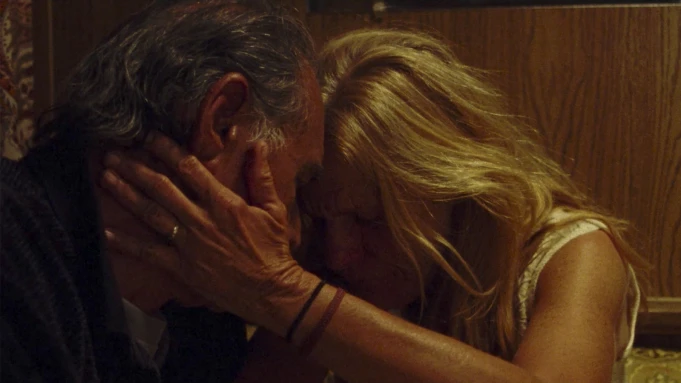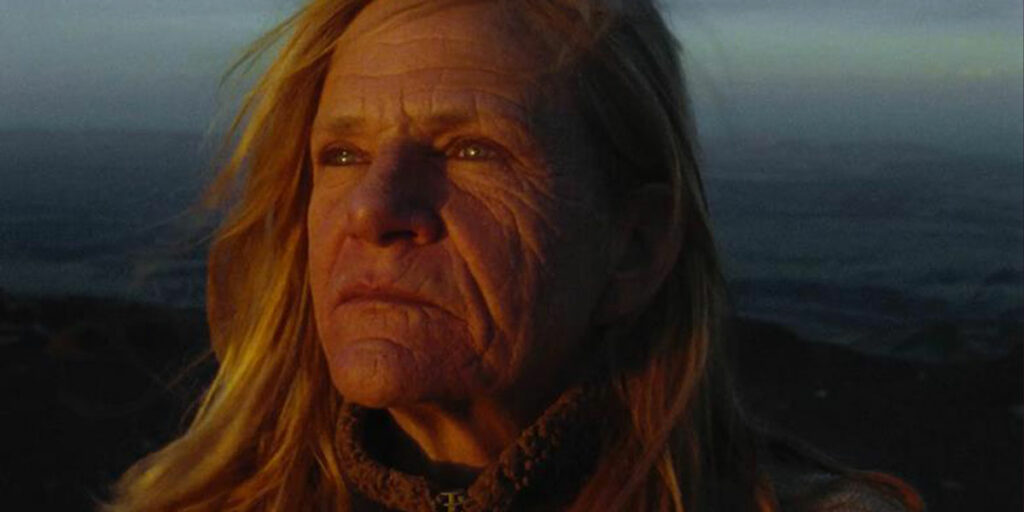A Love Song is a gentle, minimalist meditation on how to make the most out of what little time we have, and a much-needed showcase for Dale Dickey.
Of all the films I had lined up to review for Tribeca, A Love Song was what I considered my biggest gamble. It’s a small, quiet film with tender themes and almost no plot, which are the kinds of movies that usually either really work for me with a softly heavy emotional impact, or really don’t work for me with a boring lack of purpose. And while A Love Song could have very easily veered into the latter territory, it always holds sturdy and has come out as easily my favorite film of Tribeca so far.
Max Walker-Silverman’s directorial debut sees an elderly woman named Faye (Dale Dickey) arriving in her trailer at a Colorado campsite. She’s there awaiting the arrival of former sweetheart Lito (Wes Studi), whom she hasn’t seen since their childhood. Both she and Lito are widows with a lot to catch up on, and we watch them talk about their lives, learn and listen to music, and possibly come together in a way they’ve dreamt about for decades.
There’s really not much more to the film in terms of plot, which is what I was expecting. A Love Story is very much a minimalist movie, containing long stretches with little to no dialogue and only showing you the absolute bare essentials needed to make this story work. It’s all about the visuals, atmosphere, and a tiny pinch of backstory. This could go, and has gone, very wrong, setting the film up to potentially feel incomplete or aimless. But Max Walker-Silverman, right out of the gate, understands how to do this approach right and what to focus on to get the most out of the smaller details he offers.
A film that’s so heavily reliant on such details is hard to talk about without giving anything away, but to put it as broadly as possible, I see the entirety of A Love Song as a microcosm of a whole final stretch of one’s life, split evenly into thirds. At the start, Faye is nothing more than an onlooker to the environment and people around her. She keeps to herself, largely in a single location, and plays a role in other people’s stories without really having one of her own. On some level, you can see that even she realizes this, feeding into her bittersweet aura.
Then, something from the past, in this case the love that never was, comes back, and life returns to her eyes as they catch up and interact. The history between these two is kept mostly vague, as we never learn why they grew apart or what really spawned this idea to meet out here. But while I think A Love Song conceals a bit too much information for the emotions hit as hard as they could have, the performances are so good and the words exchanged so simply honest that we’re still enticed enough to fill in the blanks with whatever we want.
In fact, because these two characters were both married to different people, you would think that they’d moved on from each other and wouldn’t have any massive regrets. But the way they carry themselves, especially Faye, heavily implies that something was always empty in the paths they chose, whether it be because their love for their spouses faded, they never were really over each other, or any number of things. Again, we don’t have any answers or even breadcrumbs to follow, but we’re drawn in enough to think about what could have happened.
But it’s the ending stretch of A Love Song that hits the hardest, where you realize that the entire story is solely meant to center around Faye. She finds herself realizing, sooner than I was expecting, that what she’d hoped for by coming out to this campsite is not going to happen. At this point, it looks like the remainder of the film will largely mirror the first act with aimless waiting. But a new purpose evolves, pretty much entirely through visual means. She ventures out into a lot more of the landscape she’s been surrounded by, and we see that there was so much beauty that had yet to be explored until that point. Beauty that isn’t what Faye was looking for, but she nonetheless finds.
It’s at this point that I realized the entire purpose of A Love Song was her having that epiphany towards her entire life. She’s lived in silent yearning for so long, only to come to accept and embrace what’s still there for her and learn to appreciate it while she still can. She even then goes and impacts some of the lives she’d come across earlier, adding meaningful purpose where she once thought there would be none. What starts as bitter defeat becomes peaceful acceptance. Even the way Faye listens to love songs on her radio evolves throughout the film, from wistful hope for what’s to come, to joyfully in the moment, and finally to nostalgic serenity. To do all of that through with minimal dialogue, almost no plot, and just a few select locations, and make it all resonate emotionally, is unbelievably impressive.

This task wouldn’t have been accomplished without the lovely environments captured in such a raw manner by cinematographer Alfonso Herrera Salcedo. Much of the film, especially the first half, is pretty simplistic visually, but the charm, heat, and natural beauty of the land are still a nice treat for the eyes. Near the end, there are a few jaw-dropping shots of sunset and night, as well as locations we’d only gotten faint glimpses of before, that elevate A Love Song’s cinematographyinto something truly memorable.
The only thing this film shows off better than its landscapes is Dale Dickey’s talent. I’ve seen this actress in a number of smaller roles, and she’s always been a scene stealer with some of the strongest scene presence of any performer still working today. Seeing her get the chance to carry a film in a lead role, and watching her command the frame with such quietly powerful grace, is fulfilling enough on its own, not to mention when she’s had so few chances to really do so. She has to convey so much with the subtlest of expressions, and she nails it. That’s not to discount how good a job Wes Studi does opposite her in a similarly effective role.
I really wish that I had been able to watch A Love Song for the first time on the big screen, because I have little doubt that soaking in all of its soft sensory details in that fashion is the ideal way to view it. Still, it holds up very well no matter how you watch it. A Love Song is a much-needed leading showcase for Dale Dickey, as well as a gentle, thought-provoking meditation on regret, hope, and how to make the most out of what little time we have.
It’s rare that I see a film wield this level of minimalism this remarkably well, making so much out of so little. The length is great as well, taking up just the amount of time needed without any pointless padding or distractions. Max Walker-Silverman did something really special for his first-ever feature film, and I have faith that A Love Song will end up being considered one of 2022’s hidden little gems.
A Love Song premiered at the 2022 Tribeca Film Festival on June 13, 2022. The film is now available to watch on digital and on demand in the US, and will be released in UK cinemas on December 9, 2022.

